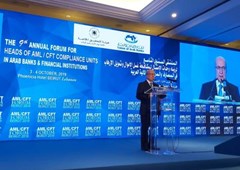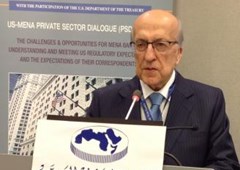Opening Speech
Dr. Joseph Torbey
Chairman - World Union of Arab Bankers
Chairman General Manager - Credit Libanais Group
The 30th International ICC-FraudNet Meeting
Asset Recovery, Confiscation and Anti-Fraud Measures in the Banking System
October 11, 2019
Phoenicia Hotel Beirut
Ladies and Gentlemen,
Throughout human history, fraud has been ever-present and ever-evolving, as bad actors were never short on greed or
imagination. In today's world, financial fraud is multifaceted, with broad titles including tax evasion, money
laundering and terrorist financing, misappropriation of funds, bribery, procurement fraud, corruption, and
cybercrime.
The digitalization of information and the increasing complexity of modern technology have helped financial fraud to
thrive and mutate, with financial criminals nowadays better equipped than ever to disguise their identities and
commit immoral actions. Digital currencies have made it increasingly difficult to track cross-border cash flows.
Weaknesses in cybersecurity controls have allowed high impact data breaches, which facilitated fraudulent
activities committed with stolen personal data. Emerging threats such as attacks powered by artificial intelligence
will present a new series of risks.
In business terms, the cost of fraud is financial loss – which negatively affects a business’ productivity,
reputation and ability to generate revenue. Fraud, especially when serious or repetitive, can undermine trust and
create crises of confidence – a lethal combination particularly for the banking sector. Prominent large scale
examples of corporate fraud include Enron, Arthur Andersen, Bernie Madoff, and many others.
Fraud is rampant in our region of the world. Roughly a third of financial organizations in the Middle East,
surveyed by PWC, have reported being subjected to cases of fraud between 2016 and 2018, with costs ranging from
$100,000 to $50 million per organization. More than half of fraud cases in the MENA region were attributed to asset
misappropriation, mainly by employees or senior managers, with cybercrime accounting for another third, and the
rest credited to procurement, bribery and corruption.
Globally, both the public and private sectors have set up regulations aimed at combating financial crime.
Compliance programs within banks in the Arab region are notably abiding by the recommendations of the Financial
Action Task Force (FATF) to combat money laundering and terrorism financing, as well as those of OECD's Global
Forum on Transparency and Exchange of Information for Tax Purposes. Financial institutions deploy continuous
efforts to enhance their authentication techniques – through biometrics or otherwise – to prevent criminals from
illicitly using compromised data to open new accounts or access existing ones. Laws are promulgated and enacted to
strengthen cybersecurity against data breaches, notably the EU’s GDPR, and introduce new requirements for
authentication and transaction monitoring for payment processors.
Compliance budgets in the MENA region have now matched global figures, with more set to be spent in the future.
Many countries in the region have established robust financial regulatory authorities, such as the Dubai Financial
Services Authority (DFSA) or the Financial Services Regulatory Authority (FSRA) in the United Arab Emirates, and
the Special Investigation Commission (SIC) in Lebanon, and have also set laws aimed at defining and penalizing
financial crimes, notably in the UAE and Lebanon. Noteworthy here that Lebanon thoroughly complies with a large set
of international regulations such as the :
KYC (Know your Customer),
FATCA (Foreign Account Tax Compliance),
CRS (Common Reporting Standard),
GDPR (General Data Protection Regulation),
AML/CFT (Anti-Money Laundering/Counter Financing of Terrorism)
Risk Based Approach rules, and list goes on.
In Lebanon, a specific Financial Prosecutor is assigned the tasks to instruct and enforce financial offences and
crimes.
Moreover, the Arab banking sector is also keen on complying with all applicable local and international rules and
regulations and adhering to global correspondent banking requirements, notably the Foreign Account Tax Compliance
Act (FATCA).
7 Arab countries have signed the Multilateral Competent Authority Agreement (MCAA) which establishes compliance
with OECD's Common Reporting Standards (CRS); the remaining countries are in the preliminary process that would
pave the way for joining the Agreement in the future. The region also saw the establishment of robust compliance
groups, notably the MENA Financial Crime Compliance Group (MENA FCCG) – comprised of 13 Arab banks, in strategic
partnership with the Union of Arab Banks – to prioritize the fight against money laundering and the financing of
terrorism.
Yet one of the main facets of financial fraud that remains elusive – and one that adds significant cost to doing
business in many developing countries – is corruption.
In terms of corruption, our region is no stranger to this vice, with 19 out of 21 MENA states scoring below average
on the Corruption Perception Index and similarly so on The World Bank’s Worldwide Governance Indicators.
From another angle, and in the wake of the Arab Spring of 2011, interest in tracing illegal assets and asset
recovery gained prominence in our region. A partnership between the World Bank and United Nations Office on Drugs
and Crime (UNODC), the Stolen Asset Recovery Initiative (StAR), helped recovery efforts in an attempt to install an
era of greater transparency in Egypt, Irak, Tunisia, and Libya.
StAR helped return $28.8 million in funds from Lebanon to Tunisia in the end of 2012, after the toppling of Zein El
Abidin Bin Ali, by facilitating contacts between Lebanese and Tunisian authorities and building Tunisia's capacity
to prepare requests for assistance. Physical assets valued at approximately $58 million were also returned to
Tunisia from France, Italy, Spain, and Switzerland. Recovery of assets in Tunisia from other jurisdictions is still
ongoing. Similarly, StAR helped recover nearly $150 million from the Netherlands to Libya in 2011, after the
toppling of Muammar Gadafi, and the funds were used by the WHO to distribute medical supplies that were direly
needed in Libya; further asset recovery cases are ongoing. Cases are ongoing as well with regards to asset recovery
in Egypt and Sudan following the toppling of Hosni Mubarak and Omar el Bachir.
Asset recovery is a complex process. Tracing stolen assets is also an arduous task since money can easily be
stashed in art, antiques, jewelry – all of which are portable and difficult to trace. The use of offshore vehicles
and digital currencies requires creative asset tracing processes, in addition to the use of frameworks – such as
the one for anti-money laundering – in the freezing or seizure of assets, as well as achieving a higher standard of
international cooperation in both the investigative and legal proceedings related to fraud.
Multiple tools to combat corruption exist, but they all depend on a strong and united political will to invest in
higher levels of transparency in the Arab countries. A starting point would be to reform fiscal institutions and
laws, and allow external audit agencies – and the public at large – to provide effective oversight.
Fighting corruption also goes beyond reforms. Investing in Education and spreading Transparency and Anti-Fraud
awareness is an important means to turn the tide against corruption, as it propagates ethical values, informs
people of their rights and duties, and encourages them to actively take part in political life – thereby demanding
better standards of governance, transparency, and accountability from their respective governments.
In conclusion, assets lost to corruption can – and should – be recovered. Financial criminals must be pursued in
accordance with applicable laws, to reinforce economic stability and the well-being of people.
Thank you for your attentive listening.

